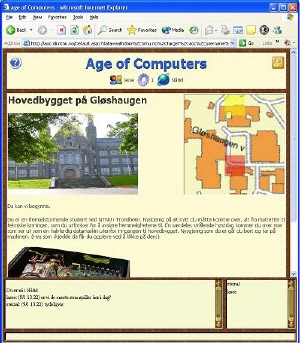|
||||||||||||
Age of Computers (AoC)
|
||||||||||||
INTRODUCTIONAge of Computers (AoC) is an online multiplayer game used in teaching
of computer fundamentals in the M.Sc. study in computer science at NTNU
in Trondheim, Norway. It supplements traditional auditorium lectures by
a rich set of problems in a computer game like environment. The story
of the game is linked to the historical periods (epochs) of computers,
and the content is organized in rooms or places on a map. A chat window
for each historical period is used for communication with other students
and teaching assistants. The first version of AoC, AoC-1, was used in
a class with 250 students the fall semester 2003 in the course TDT4160
"Datamaskiner Grunnkurs" (Computer Fundamentals). AoC is now
in version 3, and has been used in the course Computer Fundamentals every
term from 2003. The purpose of this webpage is to make results and experience from the AoC project available to those that are interested. Please feel free to send us comments, suggestions, or questions. The course contents in AoC is written in Norwegian, but the publications, presentations and resources made available here are mostly in english. Responsible/contact: Lasse Natvig (Project leader) |
 |
RESOURCES
AoC-3 Resources:
AoC-3 is open source software, and is shipped with it's own graphical Administration Tool. We have written an Installation Guide to make it easy to get started with AoC. In addition, documentation is available on how to use the Administration Tool. If you download AoC we would appriciate if you send us an E-mail to Lasse Natvig with a few lines of text describing your intended use. That will also make it possible for us to inform you about eventual updates, new AoC-relevant information and new versions. If you have questions or comments, do not hesitate to contact us.The available files can be found here: AoC Source Code | Installation Guide | AoC Admin User Manual
AoC-1 Resources:
Experimental Validation: In [5], we investigated the learning effectiveness of AoC-1 compared to paper exercises and textbook reading by carrying out a controlled experiment. The results indicated that - with equal time spent on the various learning activities - the learning effect of AoC was equal to the other learning activities. This is a promising result, as the increased motivation from playing the game makes the students work more in the course.
The following files are available: Pre- and post-test | Pretest (in Norwegian) | Posttest (in Norwegian) | Paper Exercise (in Norwegian) | Paper Exercise Solution (in Norwegian)
Questionnaires: Two extensive questionaires about
AoC in its first year were carried out. Available document are:
AoC1-Questionnaire 1:
Complete questionnaire (in norwegian), Questions
analysed, summary
of the 137 answers (in norwegian), correlation
matrix.
AoC1-Questionnaire 2: Complete questionnaire (in norwegian), Questions
analysed, summary
of the 73 answers (in norwegian), correlation
matrix.
AoC1-topic graph (Main topics covered in the
book
by Stallings, in norwegian). Reading list
(doc, in norwegian).
Presentations:
AoC-1 was presented at the ITiCSE conference on Innovation and Technology in Computer Science Education in June 2004 [1] and at the FIE 2004 Frontiers In Education conference in Savannah, Georgia, in October 2004 [2]. At the Norwegian Informatics Conference in Stavanger in November (NIK 2004) we presented a paper that focuses on the differences between AoC-1 and AoC-2 [3]PUBLICATIONS
- [1] Age of Computers - Game-Based Teaching of Computer Fundamentals,
in Proceedings of ITiCSE
2004 , Lasse Natvig and Steinar Line.
- [2] "Age
of Computers:" An Innovative Combination of History and Computer Game
Elements for Teaching Computer Fundamentals, in Proceedings of FIE
2004 ,
Lasse Natvig, Steinar Line and Asbjørn Djupdal.
- [3] Age of computers II - an improved system for game based teaching, in Proceedings of NIK 2004, Asbjørn Djupdal and Lasse Natvig. Presentation.
- [4] A Compulsory yet Motivating Question/Answer Game to Teach Computer Fundamentals, In Computer Applications in Engineering Education, forthcoming, Lasse Natvig, Guttorm Sindre and Asbjørn Djupdal.
- [5] Experimental Validation of Learning Effect for a Pedagogical Game
on Computer Fundamentals, Submitted to IEEE Transactions on Education,
Guttorm Sindre, Lasse Natvig, and Magnus Jahre.
| Editor: Kontorsjef: Eivind Voldhagen | Contact address: Lasse Natvig | Last updated: 29.11.2007 |